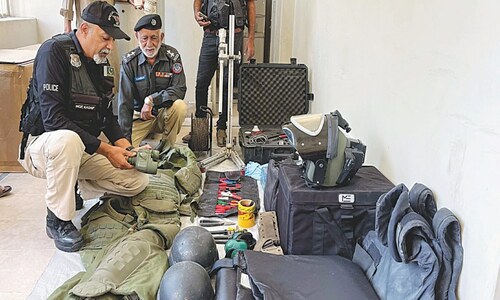 KARACHI, March 28: Speakers at a seminar held on Tuesday, the fifth day of the World Social Forum-2006, expressed their concern over the fact that a major chunk of the funds meant for development projects was being spent by the government and NGOs on hiring consultants, setting up offices and buying vehicles.
KARACHI, March 28: Speakers at a seminar held on Tuesday, the fifth day of the World Social Forum-2006, expressed their concern over the fact that a major chunk of the funds meant for development projects was being spent by the government and NGOs on hiring consultants, setting up offices and buying vehicles.
Referring to the ADB’s Rural Development Project as an instance, they pointed out that the project had been launched in four districts of Sindh in 2004 with the estimated cost of around $63 million but $3 million had already been spent only on consultants and offices.
Dr Anita Rajpa from India told the seminar that “land is a symbol of human feelings and a source of livelihood and existence for rural people, but in urban areas, it is a commodity for sale and purchase.”
She said that people were being displaced from their land holdings and deprived of their abodes to accommodate mega projects, which brought destruction instead of relief to the people.
Rajab Memon, a former vice-chancellor of the Agriculture University Tando Jam expressed concern over the degradation of the Indus delta, and pointed out that the number of creeks in Sindh dwindled over the years. As a result of water shortage, he said, only 13 out of 27 creeks were left were there at present. He said that up to one million hectares of land had lost to the sea intrusion. Similarly, the mangroves forests had suffered widespread destruction owing to the shortage of Indus water.
He deplored that current public sector projects had been designed implicitly by bureaucracy without the stakeholders having been consulted. Thus, the initiatives lacked genuine devolution and the participatory and sustainability approaches, he said.
Others who spoke on the occasion included Natho Khan Lund, Mr Mashkoor, Mustafa Talpur and Mohammed Ali Shah of the Pakistan Fisher Folk Forum.
At another seminar, Dr Abdul Hayee Baloch, President of the National Party, said that there was a negligible number of canals in Balochistan, hence much of water was being wasted.
 He regretted that Balochistan had been denied its due share in the revenues from the gas deposits, discovered in 1950s, while its people were being deprived of jobs and gas consumption. He was of the view that the crisis in Balochistan was political in nature and, therefore, should be resolved through political means.
He regretted that Balochistan had been denied its due share in the revenues from the gas deposits, discovered in 1950s, while its people were being deprived of jobs and gas consumption. He was of the view that the crisis in Balochistan was political in nature and, therefore, should be resolved through political means.
Criticizing feudalism, Dr Hayee said that India had done away with the feudalism soon after the partition, but it continued to flourish in Pakistan with the collusion of feudal lords and ambitious military generals. He urged people to come out of the sense of ‘victimhood’ and make themselves stronger and powerful through unity.
Ms Shabnam Rashid, speaking at seminar on the issues relating to water, said that there was no judicious distribution of water in the country. She claimed that there were many inherent flaws in the system which were creating the problem of salinity. She said that due to ‘green revolution’ in 1960s, water requirement for agriculture purposes had increased up to 300 per cent.
She believed that the tendency of installing private tube-wells was also on the increase which had further compounded the problem.
Irfan Mufti suggested that the South Asia People’s Water Commission should monitor the distribution of water and do a damage-assessment of lands and crops independently.
Hasan Lashari, Mohammed Tehsin and Ms Uzma Zareen also spoke at the seminar.













































Dear visitor, the comments section is undergoing an overhaul and will return soon.